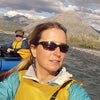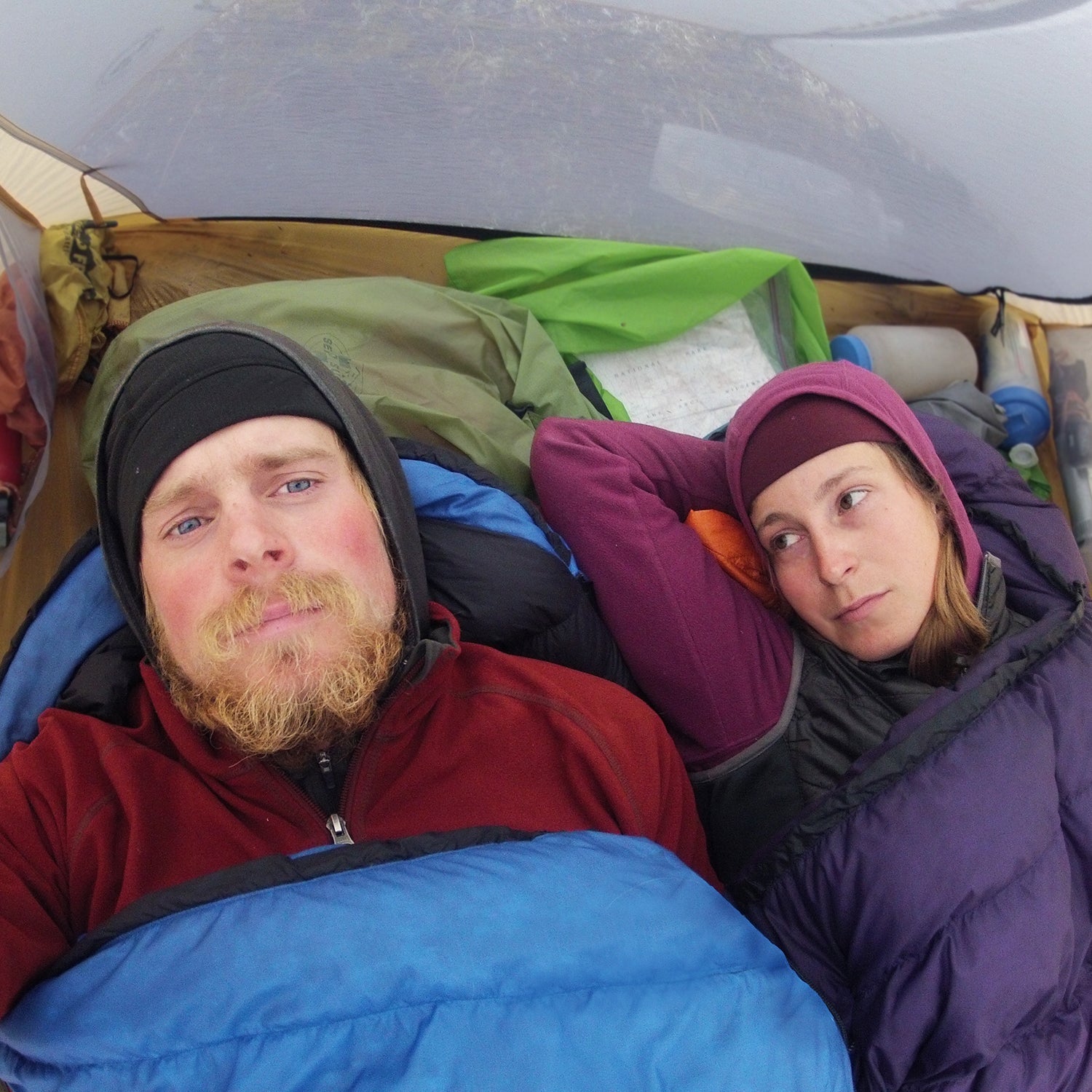Most couples don’t choose to isolate themselves in confined spaces. So when people learn that my husband, Pat, and I completed a six month, from Washington’s coastal��rainforest to Alaska’s Chukchi Sea, it’s not the mileage accrued or the remoteness of the terrain that immediately stand out. It’s that our relationship was intact at the end of it.
On our trip, Pat and I traveled 4,000 miles by rowboat, ski, foot, packraft, and canoe. For 176 days, we spent every moment together, with the exception of a rare shower or solo post-office run at one of our resupply points. This translated into hundreds of hours in a 32-square-foot tent, with no doors, no bathroom, and no privacy.��
This wasn’t the first time we’d ventured into the wilderness together. Our experiences as a couple have been defined by multi-pitch rock climbs and quiet coves. We’ve crossed unnamed glaciers and built a log cabin on the shores of an Alaskan fjord by hand. Still, every relationship has limits. Our journey across Canada and Alaska tested many of them.
We rowed through spring storms that left ferries grounded and seawalls demolished. We met dozens of bears, including one that wanted to eat us. We paddled through mosquitoes so thick that simply breathing became a chore. We lay starving in a tent in a rainstorm, wondering if we’d meet our end in the most unglamorous of ways. Yet the most common question I’ve been asked has nothing to do with any of these hardships. Instead��it’s: How did you possibly take a trip like that and stay married?��
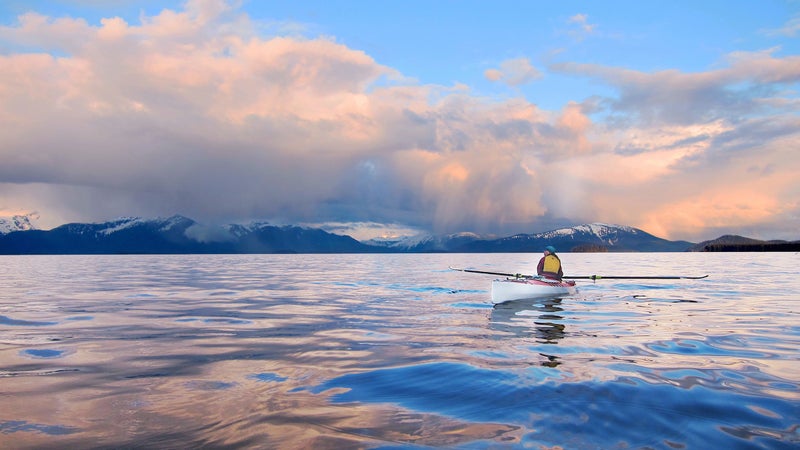
Now, more than a decade into marriage, our wanderlust hasn’t changed, but our circumstances have. We have two young sons, Huxley (five��years old) and Dawson (three), and we juggle our passions as adventurers, professionals, and parents. I’m a research wildlife biologist and writer; Pat designs and builds homes. We divide our time between our off-the-grid coastal cabin, which is accessed by boat, and a cozy house in downtown Anchorage, Alaska. Our days range from the ordinary (rushing the kids to school and ourselves to work) to the unorthodox (waking up at sea with whales for company).��
As we grapple with the new realities of sheltering in place, there are many similarities between traveling together to the end of the earth and weathering a pandemic at home. Here are some of the lessons we’ve learned.
Face the Charging Bear
In a far-flung valley of the Brooks Range of northern Alaska, we were stalked by a predatory bear. When I stepped into a clearing and heard rustling close behind me, I turned to find a large, cinnamon-colored bruin staring at me, its sinister intentions immediately clear. For the next 30 minutes, Pat and I fought for our lives. The bear circled around us again and again, ignoring pepper spray, screams, and flying trekking poles. Eventually, we made a break for a nearby river, understanding for the first time what it meant to be hunted.��
Although the encounter itself was terrifying, the worst part came later, after the adrenaline had faded and we faced another night in the tent. While I spoke in rising tones of all the ways a bear could kill us, Pat reverted to calm logic. He reminded me that predatory attacks are exceedingly rare; besides the one anomalous bear that we’d never see again, the odds leaned heavily in our favor. When nothing else worked, he insisted that we confront our fears directly. With shoulders pressed together, we peered at the screen on the GoPro camera that had been strapped to his chest during our encounter. Though the footage was eerily reminiscent of a last record of our days, after I’d replayed it several times, the burning in my throat began to ease. We’d done everything right. The fear was real, but so was our response.��
Managing our emotions together is necessary in any crisis, especially when an invisible virus lurks nearby, seemingly waiting to envelop us in its death grip. Now��Pat and I focus on what we can control—the choice to stay home;��helping our communities by making masks, sharing supplies, and shopping local; and taking��care of each other. We may be overwhelmed, but we are not powerless.��
Stay in Your Lane
When we’re limited by square footage, we have to get creative with how to coexist. As Pat and I��hiked, skied, and paddled across some of the most remote landscapes on earth, personal space abounded. But once we crawled into our tent, it was a free-for-all of wet socks, elbows, and numerous��Ziplocs. We learned to take turns getting dressed and undressed, but maintaining an invisible line across the floor of a tent that barely sleeps one simply wasn’t possible. Our only solution was to expand our notions of space beyond the physical world. Being left in silence for a few minutes can do wonders to reduce the feeling of being cramped. When I saw Pat tracing imaginary routes off the edge of our map, I respected his private form of escapism. Alternatively, pulling out my journal was his signal to let me be.
While we can’t change the dimensions of our bedrooms or grow a home office from an unheated, windowless shed, we can offer each other the psychic space we need now. For me, this means reading uninterrupted, even if there are 30 other things to do. For Pat, it’s the diversion of designing a skin-on-frame rowboat to build with our boys at some undetermined point in the future. For those of us who have access to the outdoors, a solo burst of fresh air is the surest bet for making close quarters more tolerable.
Play to Each Other’s Strengths
The biggest fight we had on our trip revolved around how much weight we each carried. One morning in early August, we woke to a small band of caribou gathered around our tent, their hooves clacking against the rocks. The season’s first snow covered the reddening tundra, a stark reminder that winter was on its way. Over the previous��few days, I’d been struggling with my heavy load as we trekked long miles over steep terrain. Still, I held tight to my pride, insisting I could handle my share. So when I caught Pat secretly removing one of the food bags from my pack, I was irate. “I was only trying to help,” he said. “Your pack is too heavy.”
Pat is fiercely egalitarian. He’s the first to correct our sons when they refer to construction workers as men. He’s always championed my own successes over his own. But he also happens to be good at all of the things that we consider stereotypically masculine: splitting wood, hoisting a 100-pound pack, reading maps, and climbing big mountains.��
His simple act of kindness laid bare all of my lingering insecurities. From the beginning, I’d done everything I could to ensure that I would be an equal partner on this expedition. But as a 115-pound woman, I was acutely aware of my own physical limits. For the rest of the day, we barely spoke.��
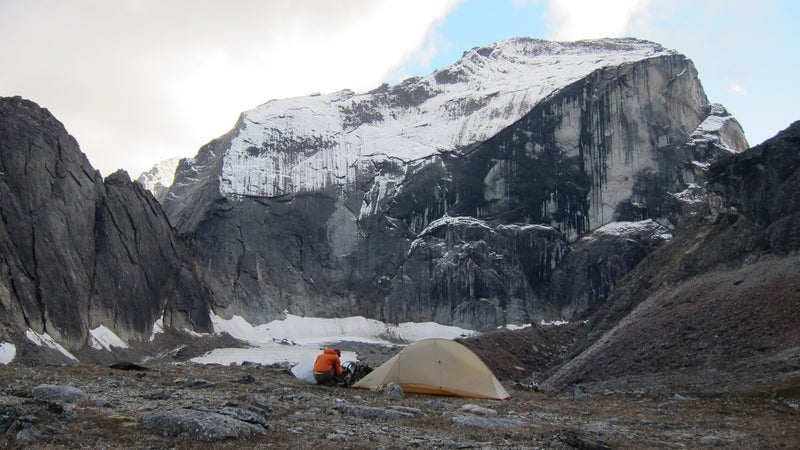
That evening, as I warmed my hands silently by the campfire and listened to wolves howling in the darkness, I realized my mistake. Yes, my husband could carry more weight than me, navigate by some magical sixth sense, and build a shelter on the spot, but that wasn’t all that mattered on this trip. Just days before, I’d helped extricate Pat from an unforgiving Arctic river. I’d done much of the research to figure out our route. I’d been the one who’d planned our meals and executed most of the complicated trip logistics. I had to accept that a partnership is made up of more than two equal halves.
Today��the heavy lifting comes in the form of keeping track of kindergarten Zoom passwords for our sons’ online classes and performing masked grocery store runs. We’re juggling work schedules and homeschooling, toddler meltdowns and cabin fever. Not everything is equitable, and it never will be. A partnership thrives not because we weigh in equally each morning��but because we play to our strengths and help shoulder the other’s load.��
Forget the Mirror
It shouldn’t take near-death experiences for us to recognize our own superficiality, but face an avalanche or a hungry bear, and appearances quickly fall away. When privacy is reduced to the far side of a small tent, there’s little point in being modest. From Pat helping to remove my rotting big toenail to me tending the oozing butt boils he developed from rowing, we’ve seen it all. Chances are, so have you.��
During an awkward radio interview several months after we’d returned from our trip, the host asked Pat,��“How did you feel when you rolled over to find your wife looking, shall we say, not exactly her best?” Pat was so stunned by the question that he said very little in response. But in his grin, I could see all the answers I would ever need: love is so much bigger than this.
As we struggle to make sense of our rapidly changing circumstances, our rogue acne and dog-hair-covered yoga pants are likely going unnoticed. We won’t look back on the days of the pandemic and critique our attire or focus on how the camera angle added a chin or two. We’ll remember the unhurried bedtime stories with our kids, the names of the neighbors we met in the street, and that our relationship thrived, despite it all.
When Danger Lurks, Listen to Your Partner
Faced with decisions about how to calculate our risks, Pat and I didn’t always agree. On a brisk spring day, as migrating birds streamed overhead, we launched our rowboats into the open waters of the North Pacific. Soon��I noticed a light breeze against my cheek and felt the earliest twinges of concern about a possible storm. The forecast was relatively benign, but we still had many miles to cover, and I knew Pat wanted to continue. I couldn’t discern whether I was being prudent or paranoid. However,��as tiny whitecaps began to lap against my boat’s hull, my intuition suddenly spoke loud and clear. We needed to turn around—now. Pat protested only briefly, then followed my lead. Our unspoken pact was this: in the face of danger, never doubt your partner.��
Shortly after we returned to our campsite, the weather gods began to rage. If we’d continued as planned, we would have been caught in conditions we had little chance of surviving.��
Trust requires that we listen not only to our own intuition but to others’—especially if they’re recommending a more conservative plan of action in a risky situation. If your partner asks you to turn back because a sea otter gave him a snarky look, do it. If it means quarantining mail for a week before opening it, don’t protest. There’s little harm in taking a few extra precautions if it puts your loved ones at ease. Besides, in uncertain times and uncharted territory, everyone is right some of the time.��
Tell Poop Jokes as Needed��
During our 4,000 miles together, we laughed. A lot. And our circumstances weren’t always funny. Toward the end of the trip, due to a combination of bad weather and bad luck, things became unexpectedly dire. We lay starving in our tent, having not eaten in four days, waiting desperately for a food resupply that didn’t come. Between broken, sedative-laced sleep to take the edge off the pain in our stomachs, we did our best to pass the time. Pat began to narrate the postcards that he’d written to his grandparents along the way. We dubbed them the “explorer series,” each one more abbreviated and dramatic than the last. Suddenly, their tone felt bizarrely appropriate. By the third installment of the retelling, I begged him to stop, my empty belly convulsing painfully with laughter.
At the end of long, cooped-up days with two young children, three jobs, and no time to do anything well, we again turn to humor. Sometimes��this comes courtesy of our younger son, who announces his worldview with the comic authority of a three-year-old: “Mommy, it’s good the poop doesn’t climb out of the toilet. But if I fell in, I could.”
Don’t Rub It in When You’re Right
Before I met Pat, I’d always loved a good argument. Only later would I feel the remorse that came with being right at the expense of someone else’s feelings. When we first started dating, I was puzzled by his seeming disinterest in proving a point. In the face of a mistake, he’d apologize��and move on. When he was right, he assumed the action would speak for itself. It was a habit I slowly adopted, in part because a one-sided fight isn’t much fun.
On our trip, this ability to defuse tension was one of his, and by turn our, greatest strengths. It wasn’t for lack of opportunity: every day��someone had chosen the better route or had the singular wisdom to turn back before a situation became hazardous. But we were in it together, and any successes were shared. So were the losses. When we took a wrong turn that meant bushwhacking through alders for half a day or backtracking to where we’d started, we usually put our heads down and said nothing at all.
While we’re stuck at home, managing work deadlines with kids who need their bottoms wiped and grilled-cheese sandwiches cut into the likenesses of superheroes, it’s easy for tempers to run short. Some days we say hurtful things despite ourselves, but I try to remember that accepting defeat with grace is actually a win.��
Take One Paddle Stroke at a Time
Sometimes��there’s nothing to do but accept that many hard miles lie ahead. Traveling by packraft through the Mackenzie Delta’s labyrinth of mosquitoes and mud in the Northwest��Territories of Canada left us as close to defeat as we would come on our journey.��
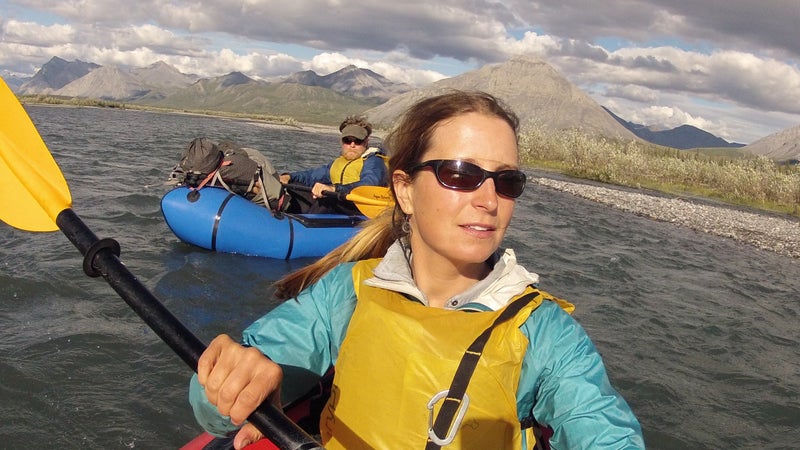
While our defenses crumbled, we found ourselves doing the unthinkable—interchanging food dishes with pee buckets to avoid leaving the sanctuary of the tent, screaming obscenities to the sky, and granting ourselves permission to scratch mosquito bites until we bled. Each morning��we chugged down cold, partially rehydrated instant coffee and set off again, knowing the only way out of our predicament was one paddle stroke at a time. As our GPS logged less than one mile per hour in the headwind and confused current, Pat would distract me with stories about early explorers eating shoe leather��and then each other. When his steadfast good nature floundered, it was my job to play the optimist, pointing to the gull I saw flying overhead as proof that the Arctic Ocean must be within reach. In this way, we leapfrogged to the coast, mustering up courage and kind words in the wake of each other’s misery.
In a world today that more closely resembles a science-fiction film than any former version of our lives, optimism can be fleeting. As school closures and unemployment stretch out indefinitely, it’s hard not to feel the press of everything we’ve already lost. But��like paddling through the Mackenzie Delta, we remind each other that this, too, shall pass. When I’m still in my pajamas at noon, sleep-deprived, and overwhelmed by commitments I can’t keep, Pat hands me my running shoes and points to the door. Later��we’ll buoy each other’s spirits by dreaming of future trips to the Arctic and beyond.
You Don’t Need Netflix When You’ve Got Nature
Outdoors, among wild creatures, Pat and I found our greatest strengths. Far offshore, in the wake of a storm that had grounded us for six days, we met a rufous hummingbird on its own remarkable journey. At just over three grams, these tiny travelers survive each day by the narrowest of margins. But in grit they have no match. From their wintering grounds in Mexico, they fly up the Pacific coast to Alaska, beating their wings 200 times per minute. After nearly a week of sideways rain and hurricane-force winds, this bird was heading north again. If a hummingbird could do it, we decided, so could we.
Even now, in our confinement, we look to birds for inspiration. Last week��our family watched a pair of black-capped chickadees prospecting for a site to raise their young. Five feet from our window, in a nest box we inherited with the house, the birds took turns flitting in and out of the hole. They peered at each other every time they emerged, like a couple consulting on a house-hunting mission. The boys howled with laughter. Pat and I recognized their domestic negotiations at work. At that moment, there was nothing more wondrous than two ordinary birds finding a place to call their own. In the promise of spring, we saw a future we could all embrace.

